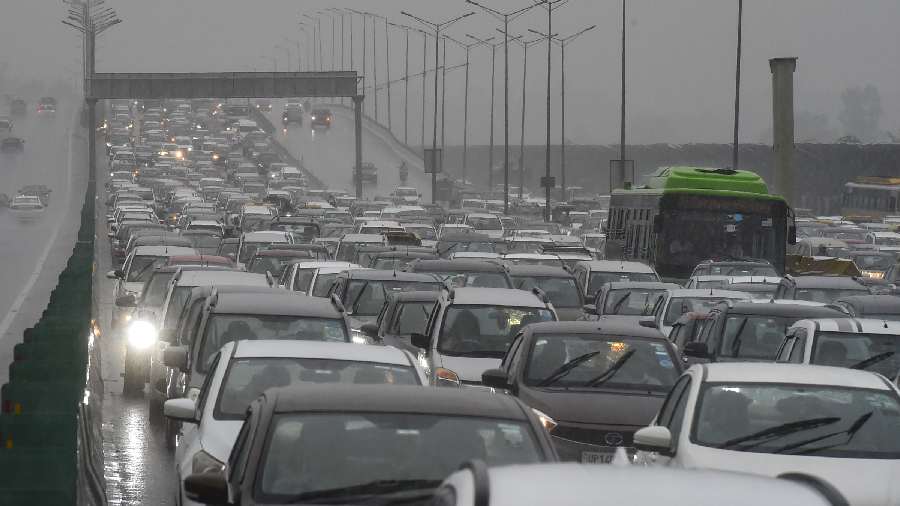The world is projected to spew 40.6 billion tonnes of CO2 (GtCO2) into the atmosphere in 2022, with no sign of the decrease that is urgently needed to limit warming to 1.5 degree Celsius, according to a new report released on Friday, coinciding with the UN climate summit in Egypt.
The projection of 40.6 GtCO2 total emissions in 2022 is close to the highest-ever annual total of 40.9 GtCO2 in 2019.
If current emissions levels persist, there is a 50 percent chance that warming of 1.5 degree Celsius will be exceeded in nine years, according to the "Global Carbon Budget 2022" report by a group of scientists who track emissions and publish in peer- reviewed scientific journals. 1.5 degree Celsius is the preferred warming limit set by the 2015 Paris Agreement -- a limit that countries hope will be sufficient to avoid the worst impacts of climate change.
Earth's global surface temperature has increased by around 1.1 degree Celsius as compared to the average in the pre-industrial (1850 1900) levels and this warming is considered the reason behind record droughts, wildfires and floods worldwide.
In 2021, more than half of the world's CO2 emissions were from three places -- China (31 percent), the US (14 percent) and the European Union (8 percent). India accounted for 7 percent of the global CO2 emissions, according to the report.
The projected emissions decrease in China (0.9 percent) and in the European Union (0.8 percent), but increase in the US (1.5 percent), India (6 percent) and the rest of the world (1.7 percent).
In India, emissions in 2022 are to increase by 6 percent, driven mostly by a 5 percent increase in coal emissions.
Emissions from oil are up sharply, with an estimated rise of 10 percent, but this returns them to about the 2019 levels, the data showed.
Emissions from natural gas in India are projected to decline four percent but contribute little to the total change as gas is a small part of the energy mix in the country.
However, this data does not tell who is responsible for the problem.
An analysis by Carbon Brief shows the US has released more than 509GtCO2 since 1850 and is responsible for the largest share of historical emissions, with some 20 percent of the global total.
At 2.4 tCO2e (tonne carbon dioxide equivalent), India's per capita greenhouse gas emissions were far below the world average of 6.3 tCO2e in 2020, according to the data published by the United Nations Environment Programme last month.
To reach zero CO2 emissions by 2050, the world would now require a decrease of about 1.4 GtCO2 each year, comparable to the observed fall in 2020 emissions resulting from COVID-19 lockdowns, highlighting the scale of the action required.
This year's carbon budget shows that the long-term rate of increasing fossil emissions has slowed.
The average rise peaked at 3 percent per year during the 2000s, while growth in the last decade has been about 0.5 percent per year.
Ulka Kelkar, Director of Climate Program, World Resources Institute, said, "At the current rate, the world could blow through its chances of staying within 1.5 degree Celsius of global warming in less than 10 years. More than half of this damage was done before 1990 when economies like India started to develop.
"Even now, India's emissions are rising from a low base compared to other large economies, and the average Indian's emissions are a fraction of the European or American. Going forward, India is fortunate to have abundant renewable energy to fuel its growth, but needs timely finance to build the infrastructure to store and transmit this energy," she said.
Pallavi Das, Programme Associate, Council on Energy, Environment and Water, said though the historical responsibility argument is critical, less attention is being paid to future responsibility.
"The net-zero pledges of China, the EU and the US will collectively exhaust 89 per cent of the remaining carbon budget of 500 GtCO2 by 2050. A mere 10-year advancement of the net zero years by these countries can release 18 per cent of global carbon space for the developing world, making the transition more equitable.
"Otherwise, the current net zero years of the developed countries will only perpetuate inequity in the climate debate," she said.












